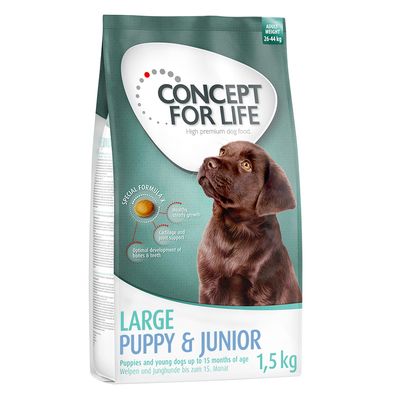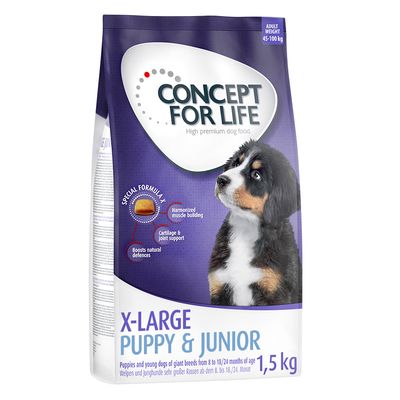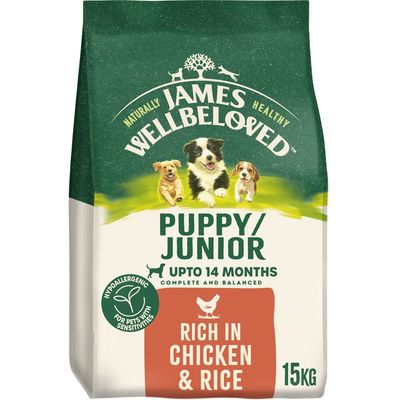Dry Puppy Food
Concept for Life Large Puppy & Junior
6kg
Delivery in 1-2 working days
Barking Heads All Hounder Puppy Days Turkey
6kg
Delivery in 1-2 working days
Concept for Life Medium Puppy & Junior
Economy Pack: 2 x 12kg
Delivery in 1-2 working days
Concept for Life Large Puppy & Junior
Economy Pack: 2 x 12kg
Delivery in 1-2 working days
Royal Canin Giant Starter Mother & Babydog
Economy Pack: 2 x 15kg
Delivery in 1-2 working days
Barking Heads Big Foot Puppy Days
6kg
Delivery in 1-2 working days
James Wellbeloved Puppy Hypoallergenic - Lamb & Rice
Economy Pack: 2 x 15kg
Delivery in 1-2 working days
Applaws Puppy Large Breed - Chicken
Economy Pack: 2 x 15kg
Delivery in 1-2 working days
Hill’s Science Plan Puppy Large Breed Perfect Digestion
Economy Pack: 2 x 14.5kg
Delivery in 1-2 working days
Applaws Puppy Large Breed - Chicken
15kg
Delivery in 1-2 working days
Hill’s Science Plan Puppy Medium Perfect Digestion with Chicken
Economy Pack: 2 x 14kg
Delivery in 1-2 working days
Concept for Life X-Large Puppy & Junior
6kg
Delivery in 1-2 working days
Nature's Variety Selected Junior - Free-Range Chicken
Economy Pack: 2 x 10kg
Delivery in 1-2 working days
Barking Heads All Hounder Puppy Days Turkey
Economy Pack: 2 x 6kg
Delivery in 1-2 working days
James Wellbeloved Puppy Hypoallergenic - Chicken & Rice
15kg
Delivery in 1-2 working days
Royal Canin Expert - Neutered Junior Medium Dog
Economy Pack: 2 x 10kg
Delivery in 1-2 working days
Applaws Puppy Small & Medium Breed - Chicken
2kg
Concept for Life X-Large Puppy & Junior
12kg
Wolf of Wilderness Junior "Blue River" - Free-Range Chicken & Salmon
1kg
Yarrah Organic Puppy
2kg
Wolf of Wilderness Junior "Blue River" - Free-Range Chicken & Salmon
12kg
What ingredients should good dry puppy food contain?
Once your puppy begins weaning (typically at around 5–6 weeks), you can start introducing dry food alongside wet meals. Over time, some owners choose to feed dry food exclusively. Look for high-quality dry puppy food with these features:
- Protein sources: Look for meat or fish as the first ingredient to help meet your puppy's energy and growth needs.
- Essential nutrients: Vitamins A, D, E, and B, plus minerals like calcium, iron, and phosphorus, contribute to supporting overall nutrition during development.
- Healthy fats and carbohydrates: Ingredients like fish oil or chicken fat and digestible carbs provide energy.
- Natural preservatives: These help maintain freshness without unnecessary additives.
- Amino acids: Naturally present in protein sources and important for normal growth.
Tip: Always check the label and consult your vet if your puppy has allergies or reacts badly to their food.
What ingredients should good dry puppy food contain?
Once your puppy begins weaning (typically at around 5–6 weeks), you can start introducing dry food alongside wet meals. Over time, some owners choose to feed dry food exclusively. Look for high-quality dry puppy food with these features:
- Protein sources: Look for meat or fish as the first ingredient to help meet your puppy's energy and growth needs.
- Essential nutrients: Vitamins A, D, E, and B, plus minerals like calcium, iron, and phosphorus, contribute to supporting overall nutrition during development.
- Healthy fats and carbohydrates: Ingredients like fish oil or chicken fat and digestible carbs provide energy.
- Natural preservatives: These help maintain freshness without unnecessary additives.
- Amino acids: Naturally present in protein sources and important for normal growth.
Tip: Always check the label and consult your vet if your puppy has allergies or reacts badly to their food.
What are the benefits of kibble for puppies?
Dry puppy food is a practical and popular choice for many owners. When chosen carefully, it can support your growing dog's nutritional needs while being easy to store and serve. Here's why many people opt for kibble:
- Convenient and budget-friendly
- Long shelf life and easy to portion
- A wide variety of formulas for breed size, sensitivities, or specific nutritional goals
- Crunchy texture, which may encourage chewing
Tip: Puppy supplements should only be given if advised by a vet. Puppies on a balanced diet typically don’t require additional vitamins or minerals.
What are the benefits of kibble for puppies?
Dry puppy food is a practical and popular choice for many owners. When chosen carefully, it can support your growing dog's nutritional needs while being easy to store and serve. Here's why many people opt for kibble:
- Convenient and budget-friendly
- Long shelf life and easy to portion
- A wide variety of formulas for breed size, sensitivities, or specific nutritional goals
- Crunchy texture, which may encourage chewing
Tip: Puppy supplements should only be given if advised by a vet. Puppies on a balanced diet typically don’t require additional vitamins or minerals.
When should I start feeding my puppy dry food?
Dry dog food for puppies can be introduced from around 4–6 weeks of age. Many owners start by softening it with warm water or puppy milk replacer to make it easier to chew.
When should I start feeding my puppy dry food?
Dry dog food for puppies can be introduced from around 4–6 weeks of age. Many owners start by softening it with warm water or puppy milk replacer to make it easier to chew.
Is it okay to only feed my puppy dry food?
Yes, high-quality dry food labelled as “complete” provides the necessary nutrients for growing dogs. Some owners choose to combine wet and dry food for variety. Speak to your vet for tailored advice.
Is it okay to only feed my puppy dry food?
Yes, high-quality dry food labelled as “complete” provides the necessary nutrients for growing dogs. Some owners choose to combine wet and dry food for variety. Speak to your vet for tailored advice.
Can large-breed puppies eat regular puppy food?
Large-breed puppies have specific nutritional needs, including controlled calcium and energy levels to help support steady growth. Choose food designed for large breeds, and consult your vet for specific recommendations and feeding advice, and learn about how to feed your puppy today.
Can large-breed puppies eat regular puppy food?
Large-breed puppies have specific nutritional needs, including controlled calcium and energy levels to help support steady growth. Choose food designed for large breeds, and consult your vet for specific recommendations and feeding advice, and learn about how to feed your puppy today.
What should I look for in the best dry puppy food?
Choose a recipe made for puppies, with animal protein as the first ingredient, balanced levels of fat and calcium, and no unnecessary additives. If in doubt, ask your vet to recommend a formula that matches your puppy’s breed, size, and energy levels.
What should I look for in the best dry puppy food?
Choose a recipe made for puppies, with animal protein as the first ingredient, balanced levels of fat and calcium, and no unnecessary additives. If in doubt, ask your vet to recommend a formula that matches your puppy’s breed, size, and energy levels.





















